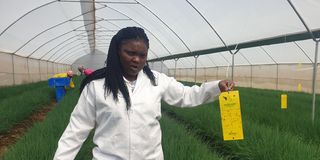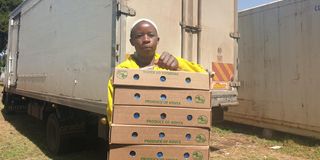Premium
Smallholder herb, spice growers unite to conquer export market

A farm worker with some freshly harvested dill. Smallholder growers of herbs and spices have united in order to easily access the export market.
Farms in Matuiku village in Nakuru’s Salgaa area are characterised by well-dug fields with maize stalks.
Some farmers are busy preparing their land as the planting season is fast approaching, while others are already planting. Most farmers here grow maize, beans and potatoes.
We take a left turn on the road that connects Matuiku to Salgaa to get to a farm whose activities are totally different from the others.
A refrigerated lorry is packed near a cold room. It is time to collect produce aggregated from smallholder farmers in the area who have beaten the odds to grow herbs and spices.
Ms Ruth Munyoro, an exporter, works with 16 farmers who grow assorted varieties of herbs and spices on their small plots and have joined hands to access the export market.
“Farmers are spread over different areas, including Subukia, Ngorika and others,” Ms Munyoro says.
“Working alone, each farmer may not be able to export his or her produce, unlike those with large farms, but jointly, they can.”

Agronomist Ruth Munyoro shows some pests traps used in a herbs greenhouse farm. Ms Munyoro spends her days on farms, inspecting crops or harvesting.
Maintain quality and standards
A professional agronomist, Ms Munyoro spends her days on farms, inspecting crops or harvesting. She has a team of workers who ensure that the required quality and standards are maintained per the particular demands of her clients.
Many smallholder farmers do not have facilities such as pack houses and coolers that are essential in the horticulture sector. While this discourages some of them, others are determined to beat the odds and utilise their small spaces to earn an income.
“I had always wanted to be an herbs and spices farmer, although I did not know where to start, until another farmer introduced me to it,” says Mr Collins Langat, who specialises in rosemary and dill farming in Elburgon.
By being in a group that aggregates produce, Mr Langat says he is able to easily get the services of agronomists and he is never worried about the market.
Meet market demands
His key duty is to ensure that his produce meets market demands and that he takes care of the crop as instructed by the agronomist.
“Exporters act as mediators between producers and the export market, saving farmers from the hustle and bustle that comes with sourcing for and satisfying different markets,” says Ms Munyoro, adding that she exports about two tonnes of fresh produce weekly, with the European Union (EU) her main market.
The EU-supported Market Access Upgrade Programme (Markup) Kenya is training farmers in different counties on group dynamics and good governance. The training has been implemented in counties including Siaya, Homa Bay, Makueni and Embu.
“We hope to train 1,500 farmers within the 12 counties in which Markup Kenya is implemented,” says Mr Maina Karuiru, the programme’s national coordinator.
“Through these training, farmers are informed on how they can work jointly in groups and reap the benefits of economies of scale.”
Global practices
Farmers will also be trained on global good agricultural practices, especially in accessing the export market.
Implemented by the United Nations Industrial Development Organisation (Unido) in partnership with the government and the private sector, Markup Kenya seeks to enhance food safety and market access for Kenyan produce locally, regionally and internationally.
While producers work to meet the required standards, access to markets is gradually becoming a challenge as the cost of transport and packaging has been escalating at an alarming rate.

A farm worker with herbs packed and ready for export. Access to markets is gradually becoming a challenge as the cost of transport and packaging has been escalating at an alarming rate.
Cost of fuel
“In two weeks’ time, the cost of fuel (to transport produce) to Nairobi has increased from Sh16,000 to Sh24,000, yet sometimes the commodity is not even available as the country has been experiencing an acute shortage,” observes Ms Munyoro.
As of November last year, the cost of packaging cartons that she uses was Sh37 apiece against the current Sh47.
This, she observes, discourages low-income farmers, who bear the burden of the high costs of transportation and packaging.
She urges the government to find ways of lowering the cost of production and transport so that fresh-produce farmers can make more profits.





